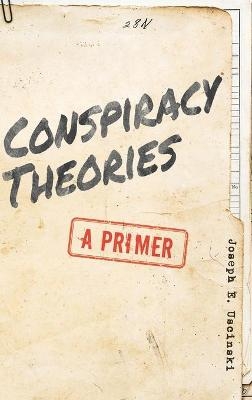
Conspiracy Theories
Rowman & Littlefield (Verlag)
978-1-5381-2119-1 (ISBN)
Conspiracy theorizing (or what Richard Hofstadter famously called the paranoid style) is an
enduring part of American politics. For such a common feature of the political landscape, there is
little consensus on why conspiratorial beliefs blossom. This is not for want of attention; large
literatures have addressed the phenomenon. For example, some argue that the causes of conspiracy
theories are psychological, stemming from cognitive quirks, authoritarian personality traits, or
psychopathologies. Sociological arguments contend that group dynamics and social status drive
conspiracy theorizing. Political scientists argue that institutional power (or lack thereof) drives
people to adopt conspiracy theories. Philosophers, on the other hand, argue that conspiracy theories
gain traction because of their unique epistemological features, which allow beliefs to prosper without standards of evidence. Each of these views provides valuable insights.
Conspiracy Theories brings together these perspectives for students to evaluate their strengths.
While engaging in rich discussion, Conspiracy Theories rigorously analyzes the most current arguments and evidence while providing numerous real-world examples so students can contextualize and visualize the current debates. Each chapter addresses important current questions, provides conceptual tools, defines important terms, and introduces the appropriate methods of analysis. Each chapter concludes with a list of important terms, questions to spark class discussion, and suggestions for further reading. The chapters will have boxed text to highlight important points with anecdotes and quotes.
Joseph E. Uscinski is associate professor of political science at University of Miami. He is editor of Conspiracy Theories and the People Who Believe Them (forthcoming), coauthor of American Conspiracy Theories (2014) and author of The People’s News: Media, Politics, and the Demands of Capitalism (2014). He received his bachelor’s degree from Plymouth State University, his Master’s from University of New Hampshire, and his Doctorate from University of Arizona. He teaches courses on American politics, public opinion, media, and conspiracy theories. His research has appeared in Journal of Politics, Political Research Quarterly, and Critical Review among other scholarly outlets. His essays have appeared in the Washington Post, Politico, Los Angeles Times, Reason Magazine, Eurozine, and Newsweek among other prominent outlets. He has been interviewed by hundreds of national and international media outlets.
Chapter 1 Conspiracy Theories across Time and Space
Why do conspiracy theories matter? This introductory chapter first discusses the important impacts
that conspiracy theories have historically had and continue to have on our politics and society. How
do conspiracy theories tie into current phenomena such as fake news, populism, authoritarianism,
overt racism, and nationalism?
Chapter 2 What is a Conspiracy Theory?
The definition of “conspiracy theory” varies widely in popular usage, and arguments about
conspiracy theories often depend on our definitions. What counts as conspiracy theory and why?
What are the main terms to know when discussing conspiracy theories?
Chapter 3 The Psychology of Conspiracy Theories
Much of the research into conspiracy theories has focused on individual psychology. What
psychological factors makes some people more prone than others to believing in conspiracy
theories?
Chapter 4 Conspiracy Theories in the United States
What are the most popular conspiracy theories in the United States currently? What are the
important conspiracy theories historically? Does conspiracy theorizing fit a pattern over time? What
theories can help us understand conspiracy theorizing in the US?
Chapter 5 The Social and Political Determinants of Conspiracy Theorizing
Group membership, be it racial, religious, or political, drives the conspiracy theories that people tend
to believe in. How does group affiliation affect conspiracy belief?
Chapter 6 Conspiracy Theories across the World
What do conspiracy theories look like in other countries? What facets of governmental structure and
culture affect the prevalence of conspiracy theories?
Chapter 7 Are Conspiracy Theories Good or Bad (or both)?
This chapter takes stock of the good, the bad, and the ugly of conspiracy theories.
| Erscheinungsdatum | 10.05.2021 |
|---|---|
| Verlagsort | Lanham, MD |
| Sprache | englisch |
| Maße | 159 x 229 mm |
| Gewicht | 399 g |
| Themenwelt | Geisteswissenschaften ► Philosophie ► Erkenntnistheorie / Wissenschaftstheorie |
| Sozialwissenschaften ► Politik / Verwaltung ► Politische Systeme | |
| Sozialwissenschaften ► Politik / Verwaltung ► Politische Theorie | |
| Sozialwissenschaften ► Soziologie | |
| ISBN-10 | 1-5381-2119-0 / 1538121190 |
| ISBN-13 | 978-1-5381-2119-1 / 9781538121191 |
| Zustand | Neuware |
| Haben Sie eine Frage zum Produkt? |
aus dem Bereich


